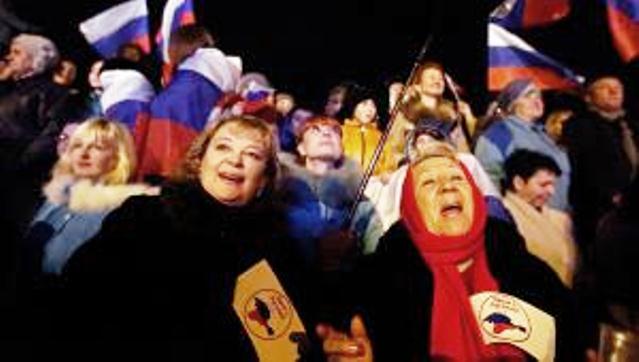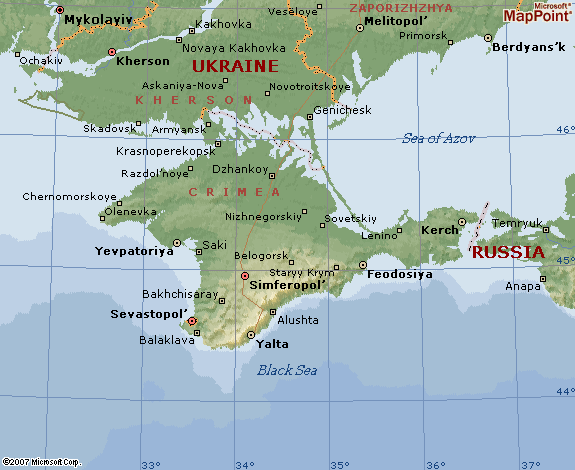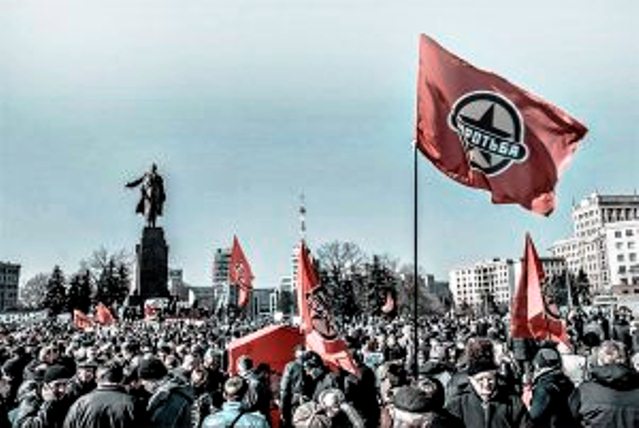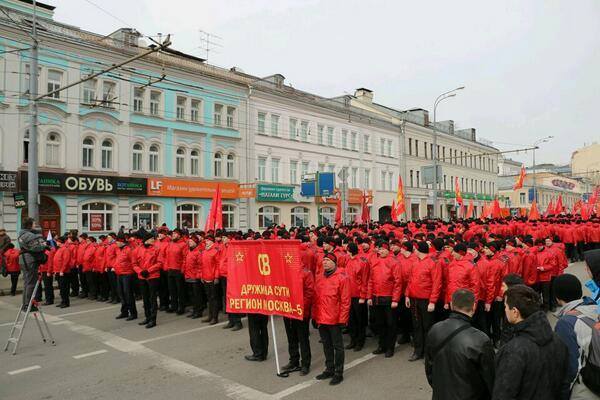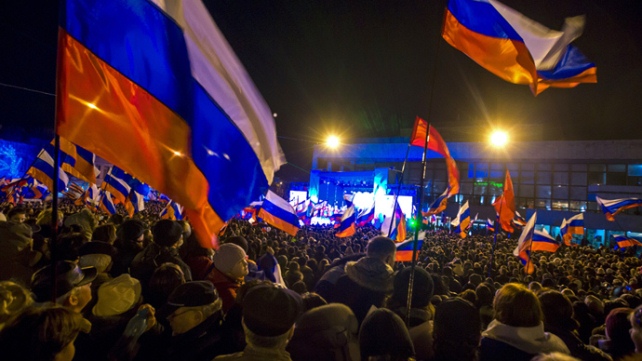
People celebrate as they wait for the announcement of preliminary results of today’s referendum on Lenin Square in the Crimean capital of Simferopol March 16, 2014 (Reuters / Thomas Peter)
95.7% of Crimeans in referendum voted to join Russia – preliminary results
March 16, 2014
95 percent of voters in the Crimean referendum have answered ‘yes’ to the autonomous republic joining Russia and less than 4 percent of the vote participants want the region to remain part of Ukraine, according to preliminary results.
With over 75 percent of the votes already counted, preliminary result show that 95.7 percent of voters said ‘yes’ to the reunion of the republic with Russia as a constituent unit of the Russian Federation.
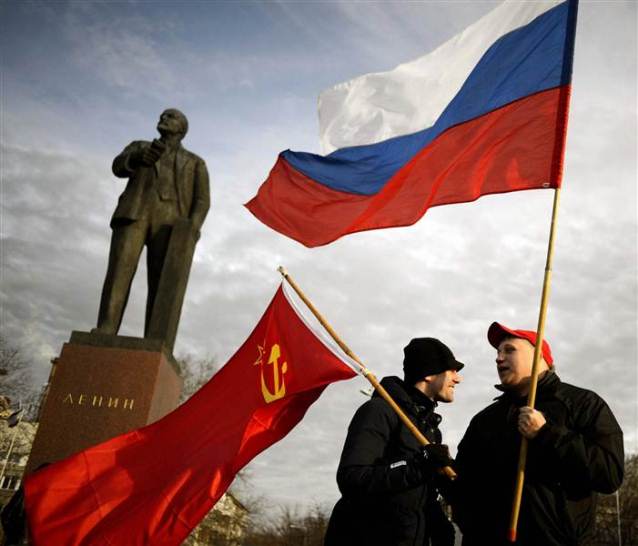
Crimean supporters of Russia demonstrate in front of statue of Vladimir Lenin, the leader of the Soviet Communist revolution.
The overall voter turnout in the referendum on the status of Crimea is 81.37%, according to the head of the Crimean parliament’s commission on the referendum, Mikhail Malyshev.
The preliminary results of the popular vote were announced during a meeting in the center of Sevastopol, the city that hosts Russia’s Black Sea fleet.
Over a half of the Tatars living in the port city took part in the referendum, with the majority of them voting in favor of joining Russia, reports Itar-Tass citing a representative of the Tatar community Lenur Usmanov. About 40% of Crimean Tatars went to polling stations on Sunday, the republic’s prime minister Sergey Aksyonov said.
In Simferopol, the capital of the republic, at least 15,000 have gathered to celebrate the referendum in central Lenin square and people reportedly keep arriving. Demonstrators, waving Russian and Crimean flags, were watching a live concert while waiting for the announcement of preliminary results of the voting.
Russian President Vladimir Putin said that the citizens of the peninsula have been given an opportunity to freely express their will and exercise their right to self-determination.
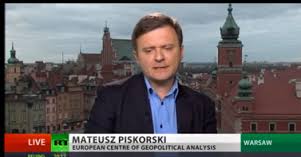 International observers are planning to present their final declaration on the Crimean referendum on March 17, the head of the monitors’ commission, Polish MP Mateush Piskorski told journalists. He added that the voting was held in line with international norms and standards.
International observers are planning to present their final declaration on the Crimean referendum on March 17, the head of the monitors’ commission, Polish MP Mateush Piskorski told journalists. He added that the voting was held in line with international norms and standards.
Next week, Crimea will officially introduce the ruble as a second official currency along with Ukrainian hryvna, Aksyonov told Interfax. In his words, the dual currency will be in place for about six months.
Overall, the republic’s integration into Russia will take up to a year, the Prime Minister said, adding that it could be done faster. However, they want to maintain relations with “economic entities, including Ukraine,” rather than burn bridges.
Moscow is closely monitoring the vote count in Crimea, said Russia’s Deputy Foreign Minister Georgy Karasin.“The results of the referendum will be considered once they are drawn up,” he told Itar-Tass.
The decision to hold a referendum was made after the bloody uprising in Kiev which ousted President Vladimir Yanukovich from power. Crimea – which is home to an ethnic Russian majority population – refused to recognize the coup-appointed government as legitimate. Crimeans feared that the new leadership would not represent their interests and respect rights. Crimeans were particularly unhappy over parliament’s decision to revoke the law allowing using minority languages – including Russian – as official along with the Ukrainian tongue. Crimeans staged mass anti-Maidan protests and asked Russia to protect them.
 THOUSANDS IN EASTERN UKRAINE JOIN CRIMEA TO PROTEST KIEV REGIME
THOUSANDS IN EASTERN UKRAINE JOIN CRIMEA TO PROTEST KIEV REGIME
By John Catalinotto on March 13, 2014
As reported by the Union Borotba (Struggle), a mass protest took place on the March 8 International Women’s Day holiday in Kharkiv city center in the eastern Ukraine. Many of the thousands carried red flags and gathered near the monument to Lenin, “which we managed to protect from the Nazis during recent rallies.”
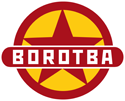 Borotba describes itself as representing four or five anti-capitalist and anti-racist groups, including former members of the youth organization of the Communist Party of Ukraine.
Borotba describes itself as representing four or five anti-capitalist and anti-racist groups, including former members of the youth organization of the Communist Party of Ukraine.
Participants denounced the new Kiev regime as representing a collaboration of the oligarchs and Nazis who, unable to cope with the socioeconomic crisis looming in Ukraine, are trying to dump the costs onto the majority of working people.
The speakers also opposed war within Ukraine, arguing that workers in western Ukraine are not their enemies. They attacked the Kiev right-wing junta for trying to “bang their heads” against the people living in the southeast of the country.
Borotba reported that the Kiev regime had sent political police to Kharkiv who tried to intimidate printers from printing leaflets against the coup “government.” They were printed anyway.
For more information on the protest or on the Borotba program, see a longer article online at workers.org or the English section of borotba.org.
Also see:
Anti-fascist protesters march in Ukraine
U.S. officials caught in Ukraine plot
As pro-imperialists besiege Ukraine, Communists warn of fascist coup attempt


